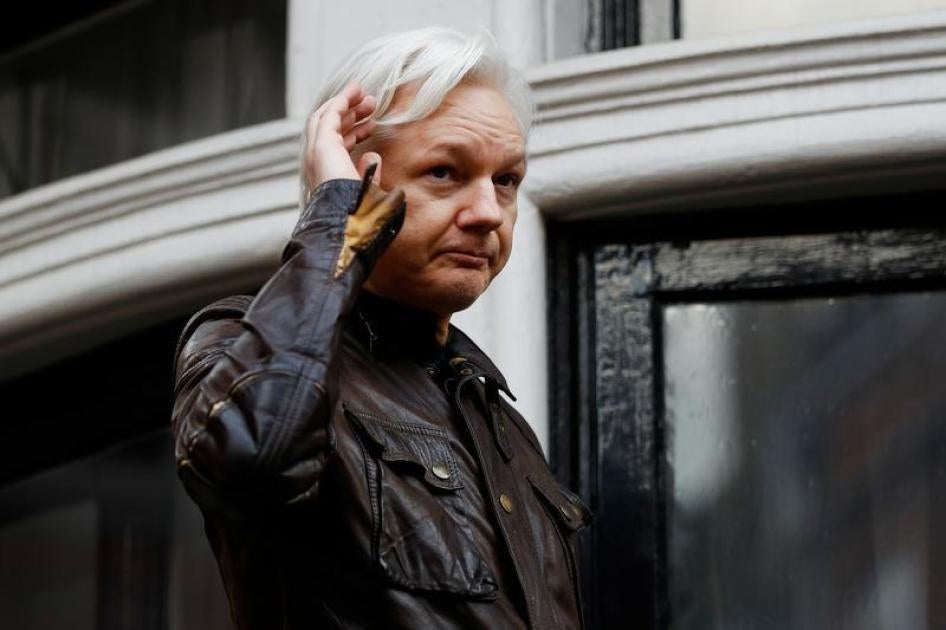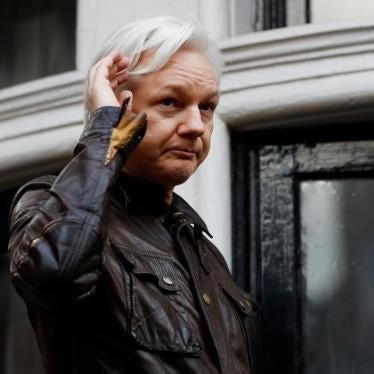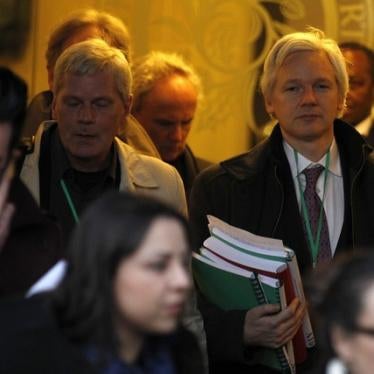London’s Metropolitan Police confirmed Assange’s arrest on April 11, 2019 “on behalf of the United States authorities” under an extradition warrant. He was found guilty of breach of bail by a UK court the same day and ordered to appear on extradition charges on May 2. The arrest is presumed to be founded on a March 6, 2018 indictment, which a US court unsealed today. The indictment charges Assange with conspiracy to commit violations of the Computer Fraud and Abuse Act, including accessing classified information, in connection with the leaks of US documents by Chelsea Manning.
“Prosecuting Julian Assange for acts often associated with publishing news of public importance – including sensitive or classified information – has potential to open a dangerous precedent for every news organization,” said Dinah PoKempner, general counsel at Human Rights Watch. “The Trump administration’s open hostility to ‘mainstream media’ has contributed to an increasingly dangerous environment for investigative journalism worldwide.”
Many of the actions listed in the indictment, such as holding encrypted chats, concealing a source’s identity, or using secure drop boxes, are part and parcel of journalism in the digital age, Human Rights Watch said. Other allegations, such as attempting to “hack” passwords, are based on particular evidence that has yet to be confirmed, disclosed, or explained.
The March 2018 indictment avoids laying Espionage Act charges against a publisher, and focuses on narrower allegations of computer fraud. But the US law they rest on has sweeping and vague proscriptions that have often been criticized as inhibiting digital research. The charges could expand, and sweep in many journalistic practices that are more common than an unsuccessful attempt at password cracking, Human Rights Watch said.
The UK authorities, in deciding whether to extradite Assange to the US, should also take into careful consideration his physical and mental condition as well as the detention conditions that he may be subjected to in the US as a person charged with national security crimes. Manning’s solitary confinement and treatment in pretrial detention was sharply criticizedas a violation of the United Nations Convention against Torture by the UN special rapporteur on torture and other cruel, inhuman, and degrading treatment or punishment.
Ecuador appears to have invited the Metropolitan police into the embassy, with President Lenin Moreno announcing that the withdrawal of Assange’s asylum as a “sovereign right” was for various reasons related to conflicts with Ecuador’s interests. Ecuador had granted Assange asylum in June 2012 on the basis of what it found was his credible fear of persecution should he be extradited to the US. Human Rights Watch expressed concern that Ecuador’s decision on asylum appears to have been withdrawn for reasons that did not address the circumstances giving rise to the initial grant.
“There is a real danger that the Assange case could become a model for governments that seek to punish media for exposing evidence of abuses,” PoKempner said. “The US government should be especially careful not to stretch concepts like ‘conspiracy’ in ways that could criminalize newsgathering globally and make it harder to expose critical information, including about human rights abuses.”








